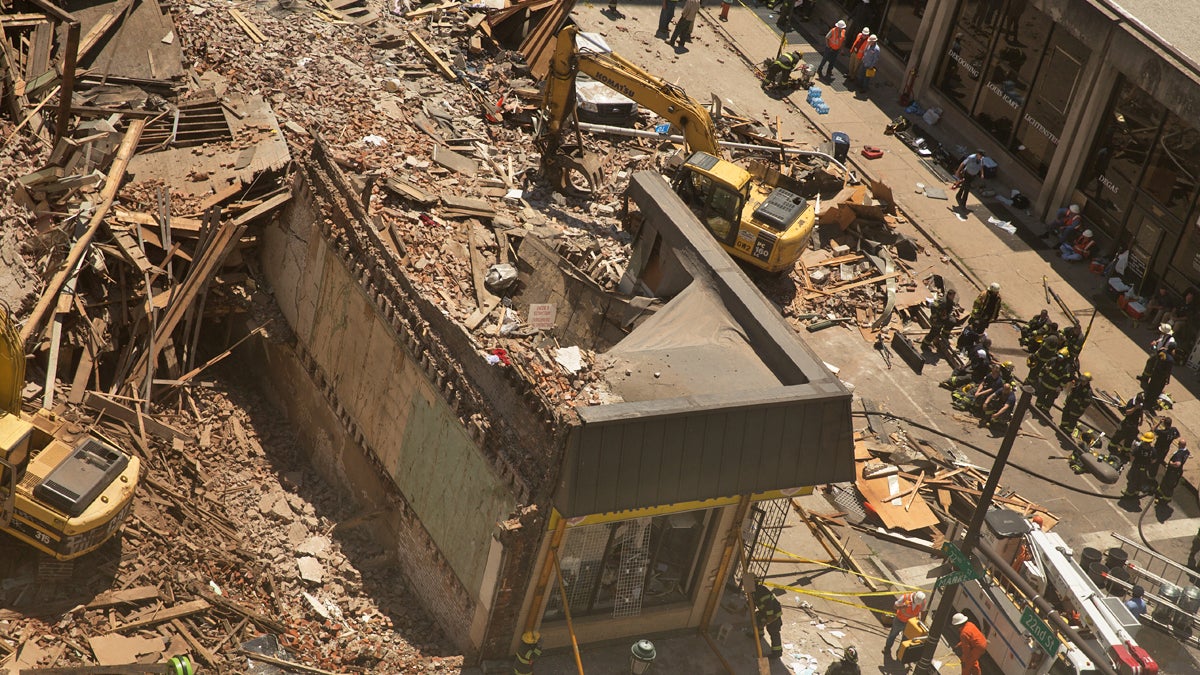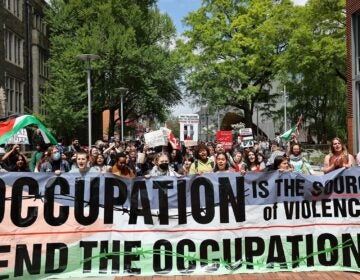Contractor in fatal building collapse gets 15-30 years; worker also sentenced to prison term
Listen
The building collapsed onto the nearby Salvation Army Thrift Store at 22nd and Market Streets. (Lindsay Lazarski/WHYY)
Griffin Campbell shook his head Friday as he walked toward a holding cell just beyond Courtroom 1007.
For nearly 30 minutes, he had implored Philadelphia Common Pleas Court Judge Glenn B. Bronson to be lenient when it came time to sentence him for his role in the June 2013 building collapse that killed six and injured 13 more.
To return him to his wife and four daughters before his life ran out.
“I know I can prove to you the person that I am,” Campbell, 51, told Bronson. “I’m not a monster.”
Bronson’s response during Friday’s tear-filled sentencing hearing: 15 to 30 years behind bars.
Prosecutors had asked for 25 to 30 years for the North Philadelphia father.
“This tragedy shook this city to its core,” said Bronson. “We may never feel quite the same walking down the streets of Center City Philadelphia.”
Sean Benschop, an excavator operator working for Campbell, was also sentenced Friday after pleading guilty to the same charges his boss was convicted of.
Under his plea deal, Benschop, 44, could not be sentenced to more than 20 years. In the end, Bronson gave him less – seven and a half to 15 years.
Beforehand, Benschop wept as he apologized for his role in the collapse.
“Words can’t express [how sorry I am],” he said.
In October, a jury found Campbell guilty of involuntary manslaughter, aggravated assault and related offenses after a three-story wall of a building Campbell was demolishing pancaked onto a neighboring Salvation Army Thrift Store.
At trial, prosecutors argued that, as general contractor, Campbell made a series of reckless decisions that ultimately led to one of the city’s biggest tragedies, including his choice to ignore repeated warnings about the unsupported wall that fell on June 5, 2013.
They also maintained that Campbell was more interested in salvaging the building’s interior fixtures than taking it down safely.
“What that shows is a reckless disregard, an extreme indifference to the value of human life,” said Assistant District Attorney Jennifer Selber after the hearing.
Bill Hobson, Campbell’s attorney, has maintained that his client is a scapegoat, paying for mistakes made by white decision-makers above him.
On Friday, Hobson reiterated those claims as he prepares to seek a new trial for Campbell, who is African-American.
“Other participants with criminal culpability have a few things in common. They’re white, they’ve got money and they’ve got political and social contacts,” said Hobson.
Plato Marinakos, the building’s architect, was granted immunity for testifying during the grand jury investigation into the collapse.
Richard Basciano, the building’s owner, was never criminally charged.
Bill Davis, Benschop’s lawyer, said his client felt his sentence was fair.
Lawsuits filed by survivors and the families of those killed have been consolidated into one civil case, slated to start in September.
WHYY is your source for fact-based, in-depth journalism and information. As a nonprofit organization, we rely on financial support from readers like you. Please give today.





